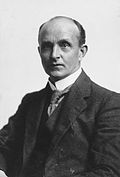| | |||||||||||||
| |||||||||||||
| |||||||||||||
| |||||||||||||
The New Zealand Labour Party leadership election, 1919 was held on 27 August 1919 to choose the next leader of the New Zealand Labour Party. The election was won by Grey MP Harry Holland.
Contents
It followed the formation of the party and merging of the United Labour Party and Social Democratic Party into one united caucus three years prior.

